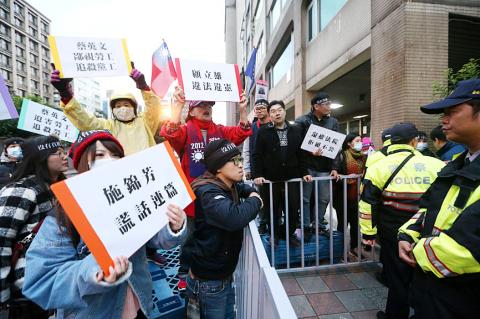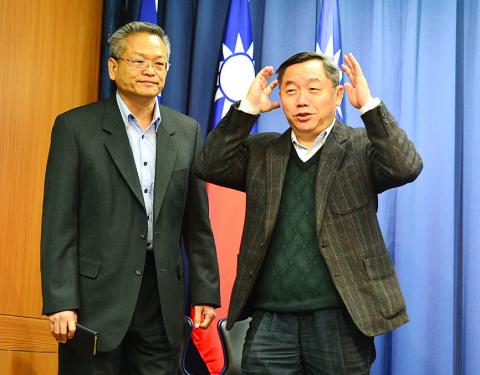The Taipei High Administrative Court yesterday ruled in favor of the Chinese Nationalist Party (KMT), suspending the transfer to the state of Central Investment Co (中央投資公司) and Hsinyutai (欣裕台) shares held by the party.
After the announcement, KMT officials claimed victory in their battle against the Cabinet’s Ill-gotten Party Assets Settlement Committee, which is headed by Wellington Koo (顧立雄).
The committee concluded that Central Investment and Hsinyutai are KMT-affiliated organizations and shares valued at about NT$15.6 billion (US$488 million) should be transfered to the state since the companies were founded using illegally obtained assets.

Photo: CNA
The committee had a letter of deposition sent to the KMT last month, giving the party 30 days to comply with the assets transfer. The party filed a court motion to block the request before a final verdict was handed down.
“The shares could be put up for open bidding or passed on to management by a third party,” said Hsu Jui-chu (許瑞助), the presiding judge and spokesman for the Taipei High Administrative Court. “However, if the KMT wins the case, then they would have lost money making the transfer. If the KMT were to be compensated for that loss, it would be a large amount to be settled.”
“If the companies were to be sold or transferred to a third party before a final verdict, then it would lead to complex legal problems, and could result in disputes, which would waste public resources. Therefore, the court has ruled to suspend the transfer of the company’s shares to the state,” Hsu said.

Photo: Wang Yi-sung, Taipei Times
Yesterday’s decision can be appealed.
In response to the ruling, Koo said it reaffirmed the committee’s conclusion that the KMT’s shares in the two investment firms were acquired using ill-gotten assets.
Quoting the court’s news release, Koo said that if the committee’s conclusion had been overturned, it would likely create a loophole whereby the two companies could divest themselves of their assets, which would defeat the purpose of the Act Governing the Handling of Ill-gotten Properties by Political Parties and Their Affiliate Organizations (政黨及其附隨組織不當取得財產處理條例), which is meant to ensure fair competition among political parties, thus improving the nation’s democratic system.

Photo: Huang Hsin-po, Taipei Times
“The KMT should stop benefiting from Central Investment and Hsinyutai. The ruling means that the KMT should neither transfer nor use the shares, effectively freezing them,” Koo said.
As to remarks by KMT Administration and Management Committee director Chiu Da-chan (邱大展) that Koo should stand down from his duties as committee chairman over the ruling, Koo said the media should ask Chiu whether the KMT would accept the court’s affirmation that the KMT shares were illegal assets as defined by the law.

LIMITS: While China increases military pressure on Taiwan and expands its use of cognitive warfare, it is unwilling to target tech supply chains, the report said US and Taiwan military officials have warned that the Chinese People’s Liberation Army (PLA) could implement a blockade within “a matter of hours” and need only “minimal conversion time” prior to an attack on Taiwan, a report released on Tuesday by the US Senate’s China Economic and Security Review Commission said. “While there is no indication that China is planning an imminent attack, the United States and its allies and partners can no longer assume that a Taiwan contingency is a distant possibility for which they would have ample time to prepare,” it said. The commission made the comments in its annual

DETERMINATION: Beijing’s actions toward Tokyo have drawn international attention, but would likely bolster regional coordination and defense networks, the report said Japanese Prime Minister Sanae Takaichi’s administration is likely to prioritize security reforms and deterrence in the face of recent “hybrid” threats from China, the National Security Bureau (NSB) said. The bureau made the assessment in a written report to the Legislative Yuan ahead of an oral report and questions-and-answers session at the legislature’s Foreign Affairs and National Defense Committee tomorrow. The key points of Japan’s security reforms would be to reinforce security cooperation with the US, including enhancing defense deployment in the first island chain, pushing forward the integrated command and operations of the Japan Self-Defense Forces and US Forces Japan, as

IN THE NATIONAL INTEREST: Deputy Minister of Foreign Affairs Francois Wu said the strengthening of military facilities would help to maintain security in the Taiwan Strait Japanese Minister of Defense Shinjiro Koizumi, visiting a military base close to Taiwan, said plans to deploy missiles to the post would move forward as tensions smolder between Tokyo and Beijing. “The deployment can help lower the chance of an armed attack on our country,” Koizumi told reporters on Sunday as he wrapped up his first trip to the base on the southern Japanese island of Yonaguni. “The view that it will heighten regional tensions is not accurate.” Former Japanese minister of defense Gen Nakatani in January said that Tokyo wanted to base Type 03 Chu-SAM missiles on Yonaguni, but little progress

NO CHANGES: A Japanese spokesperson said that Tokyo remains consistent and open for dialogue, while Beijing has canceled diplomatic engagements A Japanese official blasted China’s claims that Japanese Prime Minister Sanae Takaichi has altered Japan’s position on a Taiwan crisis as “entirely baseless,” calling for more dialogue to stop ties between Asia’s top economies from spiraling. China vowed to take resolute self-defense against Japan if it “dared to intervene militarily in the Taiwan Strait” in a letter delivered Friday to the UN. “I’m aware of this letter,” said Maki Kobayashi, a senior Japanese government spokeswoman. “The claim our country has altered its position is entirely baseless,” she said on the sidelines of the G20 summit in Johannesburg on Saturday. The Chinese Ministry